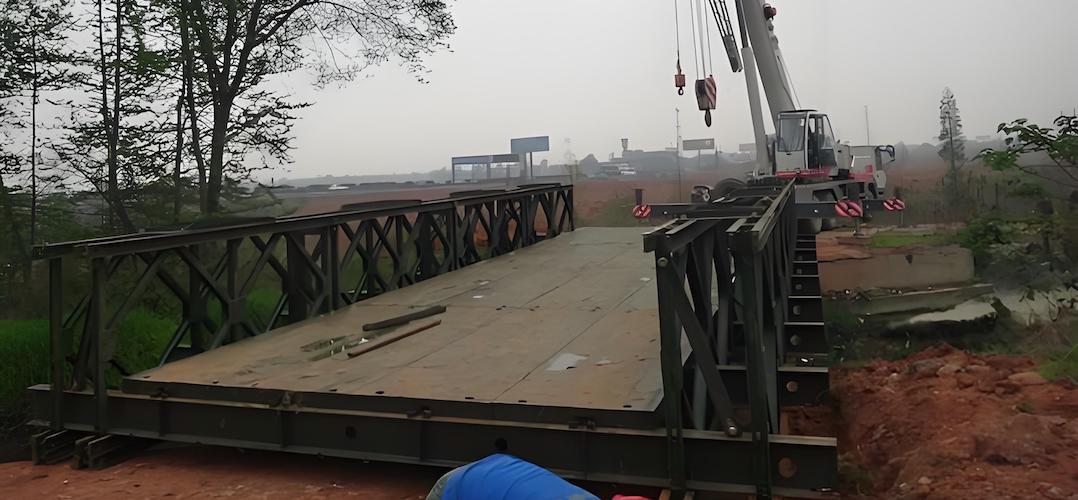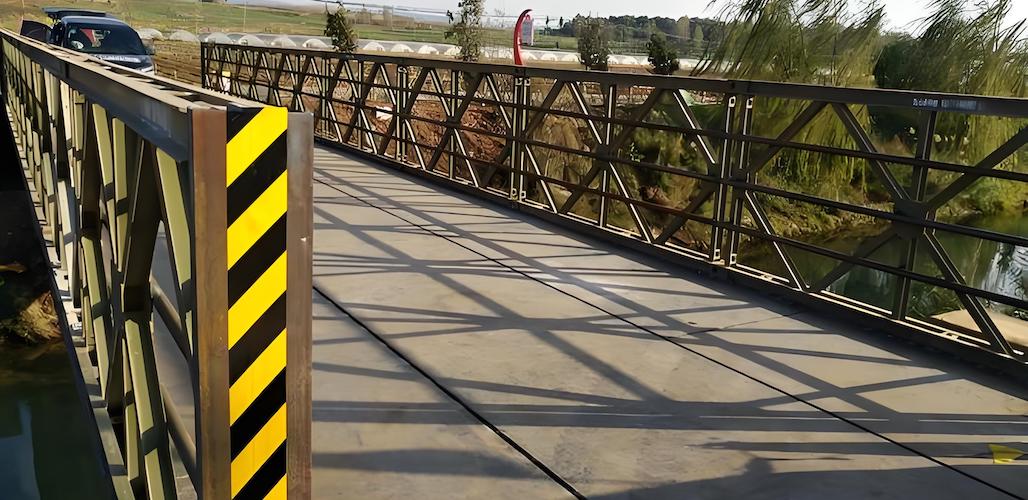Views: 211 Author: Site Editor Publish Time: 2025-10-29 Origin: Site









Content Menu
● Overview of Modular Bridge Manufacturing in Japan
>> Innovations and Technologies
● 2. Yokogawa Bridge Corporation
>> Innovations and Technologies
>> Innovations and Technologies
● 4. IHI Infrastructure Systems Co., Ltd.
>> Innovations and Technologies
>> Innovations and Technologies
● 6. Furukawa Industrial Machinery Systems Co., Ltd.
>> Innovations and Technologies
● Technological Innovations in Modular Bridge Manufacturing
>> Smart Technology Integration
● Case Studies of Notable Modular Bridge Projects
● Frequently Asked and Questions regarding Modular Bridge Manufacturers
>> 1. What are the typical lifespan and maintenance requirements for modular bridges in Japan?
>> 2. How do Japanese modular bridge designs address earthquake resistance and seismic activity?
>> 3. What government regulations and standards apply to modular bridge construction in Japan?
>> 5. How do modular bridges contribute to disaster recovery efforts in Japan?
Modular bridges have become an essential part of modern infrastructure, offering rapid deployment, cost-effectiveness, and adaptability to various environments. In Japan, a country known for its advanced engineering and construction techniques, several manufacturers stand out in the modular bridge sector. This article will explore the leading modular bridge manufacturers in Japan, focusing on their innovations, market presence, and notable projects.
Japan's geographical landscape, characterized by numerous rivers and mountainous terrains, necessitates the construction of bridges that can withstand natural disasters such as earthquakes and typhoons. Modular bridges, which are prefabricated and assembled on-site, provide a solution that meets these challenges while minimizing construction time and costs. The Japanese market for modular bridges is projected to grow significantly, driven by advancements in technology and increasing demand for resilient infrastructure. This growth is further fueled by government initiatives aimed at enhancing transportation networks and improving disaster response capabilities, making modular bridges a strategic choice for future infrastructure projects.
EVERCROSS BRIDGE is a leading manufacturer specializing in modular Bailey bridge systems. With over 30 years of experience, the company has established itself as one of the top three bridge manufacturers in China, focusing on high-quality prefabricated bridges for various applications, including military, civil engineering, and disaster relief. Their extensive experience in the industry allows them to leverage best practices and innovative solutions, ensuring that their products meet the highest standards of quality and performance.
EVERCROSS BRIDGE emphasizes innovation in its designs, offering customized solutions tailored to the specific needs of each project. Their modular bridges are designed for rapid assembly and disassembly, making them ideal for emergency situations and temporary installations. The company utilizes advanced materials and construction techniques to ensure durability and safety. Additionally, their commitment to research and development enables them to stay ahead of industry trends, incorporating the latest technologies to enhance the functionality and efficiency of their bridge systems.
One of the significant projects undertaken by EVERCROSS BRIDGE includes the construction of modular bridges in disaster-stricken areas, where quick deployment is crucial for restoring connectivity and access to essential services. These projects not only demonstrate the company's technical capabilities but also highlight their commitment to social responsibility, as they play a vital role in helping communities recover from natural disasters.
Founded in 1907, Yokogawa Bridge Corporation is one of Japan's oldest and most reputable bridge manufacturers. The company specializes in the design and construction of various types of bridges, including modular and steel structures. With over a century of experience, Yokogawa has built a strong reputation for reliability and excellence in engineering, making it a trusted partner for both public and private sector projects.
Yokogawa Bridge Corporation has embraced modern technologies, incorporating advanced materials and construction methods to enhance the performance and longevity of its bridges. Their modular bridge systems are designed to minimize traffic disruption during installation, significantly reducing project timelines. The company also invests in sustainable practices, ensuring that their manufacturing processes are environmentally friendly and that their bridges are designed to last, reducing the need for frequent repairs and replacements.
The company has been involved in numerous high-profile projects, including the construction of pedestrian bridges and highway overpasses that utilize modular designs for efficiency and safety. These projects not only improve transportation infrastructure but also enhance the aesthetic appeal of urban environments, contributing to the overall quality of life for residents.
Kawada Industries, Inc. is a prominent player in the Japanese bridge manufacturing sector, known for its expertise in steel bridge construction. With over 80 years of experience, the company has completed thousands of bridge projects across Japan. Kawada's extensive portfolio showcases their ability to handle complex projects, making them a leader in the industry.
Kawada focuses on sustainability and innovation, utilizing eco-friendly materials and advanced engineering techniques. Their modular bridges are designed to be lightweight yet robust, capable of withstanding seismic activities. The company also employs cutting-edge design software to optimize bridge performance and ensure that their structures meet stringent safety standards.
Kawada has been involved in the construction of several significant infrastructure projects, including bridges that connect remote areas and enhance transportation networks. Their work not only facilitates the movement of goods and people but also supports economic development in underserved regions, demonstrating the broader impact of their engineering solutions.
IHI Infrastructure Systems is a subsidiary of IHI Corporation, specializing in the design and construction of infrastructure projects, including modular bridges. The company has a strong reputation for quality and reliability, backed by decades of experience in the engineering sector.
IHI employs cutting-edge technology in its modular bridge designs, focusing on safety and efficiency. Their prefabricated components are manufactured in controlled environments, ensuring high quality and precision. The company also integrates smart technologies into their bridges, allowing for real-time monitoring and maintenance, which enhances the longevity and safety of their structures.
IHI has contributed to various infrastructure projects, including pedestrian bridges and highway systems, showcasing their ability to deliver complex modular solutions. Their commitment to innovation and quality has made them a preferred partner for government and private sector clients alike.
MM&KENZAI Corporation is known for its innovative approach to bridge construction, offering a range of modular solutions tailored to meet the diverse needs of clients. The company has established itself as a key player in the modular bridge market, focusing on both quality and customer satisfaction.
The company emphasizes the use of advanced materials and construction techniques, allowing for rapid assembly and enhanced durability. Their modular bridges are designed to adapt to various environmental conditions, ensuring that they can be deployed in a wide range of settings. MM&KENZAI also prioritizes sustainability, incorporating eco-friendly practices into their manufacturing processes.
MM&KENZAI has participated in numerous projects that highlight their expertise in modular bridge construction, including urban infrastructure developments and rural connectivity solutions. Their work not only improves transportation access but also contributes to the overall development of communities.
Furukawa Industrial Machinery Systems specializes in manufacturing heavy machinery and infrastructure solutions, including modular bridges. The company has a long-standing history in the industry, contributing to various engineering projects that enhance Japan's infrastructure.
Furukawa focuses on integrating advanced technology into its bridge designs, ensuring that their modular systems are both efficient and sustainable. They utilize high-performance materials to enhance the structural integrity of their bridges, making them suitable for a variety of applications, including those in challenging environments.
Furukawa has been involved in several key infrastructure projects, providing modular bridge solutions that meet the demands of modern transportation networks. Their commitment to quality and innovation positions them as a leader in the modular bridge manufacturing sector.
The modular bridge manufacturing sector in Japan is characterized by continuous innovation. Companies are increasingly adopting advanced technologies to improve the efficiency and sustainability of their products. Key innovations include:
Prefabrication allows for the construction of bridge components in controlled environments, ensuring high quality and reducing on-site construction time. This method minimizes labor costs and enhances safety during assembly. By streamlining the construction process, manufacturers can deliver projects more quickly, which is particularly important in emergency situations where rapid deployment is essential.
Many manufacturers are incorporating smart technologies into their modular bridge designs. This includes the use of sensors for monitoring structural health, which helps in maintaining the integrity of bridges over time. These technologies enable proactive maintenance, reducing the risk of structural failures and extending the lifespan of the bridges.
The use of eco-friendly materials is becoming a standard practice among Japanese manufacturers. This not only reduces the environmental impact of bridge construction but also aligns with global sustainability goals. By focusing on sustainable practices, manufacturers can contribute to a greener future while meeting the increasing demand for infrastructure development.
Several case studies highlight the effectiveness and efficiency of modular bridge solutions in Japan. These projects demonstrate the versatility and adaptability of modular designs in various environments.
The Akashi Kaikyo Bridge, known as the world's longest suspension bridge, showcases the advanced engineering capabilities of Japanese manufacturers. Its modular components were prefabricated to ensure rapid assembly and resilience against natural disasters. This bridge not only serves as a vital transportation link but also stands as a testament to Japan's engineering prowess and commitment to safety.
In response to natural disasters, several modular bridges have been deployed in affected areas to restore connectivity quickly. These projects emphasize the importance of modular designs in emergency situations, allowing for swift reconstruction and recovery. The ability to rapidly deploy modular bridges has proven invaluable in humanitarian efforts, enabling communities to regain access to essential services and support.
Japan's modular bridge manufacturing sector is at the forefront of innovation, with companies like EVERCROSS BRIDGE, Yokogawa Bridge Corporation, and Kawada Industries leading the way. The emphasis on advanced technologies, sustainability, and rapid deployment solutions positions these manufacturers as key players in the global bridge construction market. As the demand for resilient infrastructure continues to grow, the role of modular bridges will become increasingly vital in addressing the challenges posed by natural disasters and urbanization. The ongoing commitment to innovation and quality in this sector will ensure that Japan remains a leader in modular bridge manufacturing for years to come.

Modular bridges in Japan typically have a lifespan of 50 to 100 years, depending on the materials used and environmental conditions. Regular maintenance is essential, including inspections every few years to check for structural integrity, corrosion, and wear. Maintenance activities may involve cleaning, repainting, and replacing worn components to ensure safety and longevity.
Japanese modular bridge designs incorporate advanced engineering techniques to enhance earthquake resistance. This includes the use of flexible materials, seismic isolation bearings, and reinforced structures that can absorb and dissipate seismic energy. Additionally, modular components are designed to be lightweight, reducing the overall stress on the bridge during seismic events.
Modular bridge construction in Japan is governed by various regulations and standards set by the Ministry of Land, Infrastructure, Transport and Tourism (MLIT). These include guidelines for design, safety, and construction practices to ensure that bridges can withstand natural disasters. Compliance with the Japanese Road Association's specifications is also mandatory for public infrastructure projects.
Modular bridges offer several environmental benefits, including reduced construction waste, lower carbon emissions, and minimized disruption to the surrounding ecosystem. Since components are prefabricated off-site, the construction process is more efficient, leading to less noise and air pollution. Additionally, the use of sustainable materials in modular bridge construction contributes to overall environmental conservation.
Modular bridges play a crucial role in disaster recovery efforts by providing rapid deployment solutions in areas affected by natural disasters. Their prefabricated nature allows for quick assembly and installation, restoring vital transportation links and access to essential services. This speed is critical in emergency situations, enabling communities to recover more swiftly and effectively.
